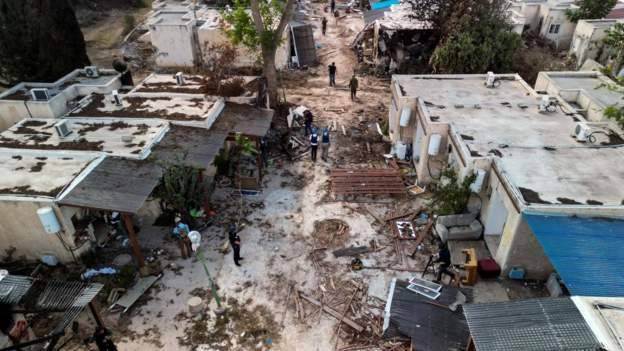As a reminder, this latest conflict erupted on 7 October when Palestinian militant group Hamas, a proscribed terrorist organisation in the UK, the US and the European Union, launched an attack on Israel.
Hamas fighters entered communities near the Gaza Strip, killing more than 1,400 people, carrying out rocket strikes, and taking scores of hostages.
Gunmen began a rampage through several kibbutzim in Israel after they broke through the border wire from Gaza, with civilians describing a massacre in these Israeli communities.
The capture of Israeli hostages is thought to be designed to pressure Israel to free some of the estimated 4,500 Palestinians held in Israeli prisons.
Hamas said it has hidden the hostages in "safe places and tunnels" within Gaza, and threatened to kill them if civilian homes were bombed by Israel without warning.
Israel's Prime Minister Benjamin Netanyahu has spoken of meeting with the families of hostages taken by Hamas.
Addressing the Knesset, Israel's parliament, Netanyahu said he listened "with tremendous pain" to the stories of the families, embraced them, and spoke of his commitment to reunite them.
"We are relentless in this effort to bring back our brothers and sisters, men and women, children and babies," he said.
Netanyahu offered thanks to US President Biden for his support, and also thanked Britain, Germany, France and Italy for their "assistance".
For four days, America’s top diplomat, Antony Blinken, has toured the Middle East, visiting no fewer than six Arab nations: Jordan, Qatar, Bahrain, UAE, Saudi Arabia and Egypt.
His aim was to listen and learn and discuss how best to get humanitarian aid to civilians in Gaza and allow foreign nationals to leave.
But the tour was also designed to let the region know the US was seeking to deter Iran from intervening in support of Hamas, which the country has long funded and armed. The presence of the US carrier group in the eastern Mediterranean is there explicitly to deter Iran’s other regional proxy, Hezbollah, from attacking Israel’s northern flank from Lebanon.
Another part of the US strategy to prevent escalation is to urge restraint on Israel.
Blinken has returned to Israel to report back on his tour. And one message will be: The way Israel seeks to destroy Hamas in Gaza - in particular the way it treats civilians - will shape how the region r
s a reminder, this latest conflict erupted on 7 October when Palestinian militant group Hamas, a proscribed terrorist organisation in the UK, the US and the European Union, launched an attack on Israel.
Hamas fighters entered communities near the Gaza Strip, killing more than 1,400 people, carrying out rocket strikes, and taking scores of hostages.
Gunmen began a rampage through several kibbutzim in Israel after they broke through the border wire from Gaza, with civilians describing a massacre in these Israeli communities.
The capture of Israeli hostages is thought to be designed to pressure Israel to free some of the estimated 4,500 Palestinians held in Israeli prisons.
Hamas said it has hidden the hostages in "safe places and tunnels" within Gaza, and threatened to kill them if civilian homes were bombed by Israel without warning.
Israel's Prime Minister Benjamin Netanyahu has spoken of meeting with the families of hostages taken by Hamas.
Addressing the Knesset, Israel's parliament, Netanyahu said he listened "with tremendous pain" to the stories of the families, embraced them, and spoke of his commitment to reunite them.
"We are relentless in this effort to bring back our brothers and sisters, men and women, children and babies," he said.
Netanyahu offered thanks to US President Biden for his support, and also thanked Britain, Germany, France and Italy for their "assistance".
For four days, America’s top diplomat, Antony Blinken, has toured the Middle East, visiting no fewer than six Arab nations: Jordan, Qatar, Bahrain, UAE, Saudi Arabia and Egypt.
His aim was to listen and learn and discuss how best to get humanitarian aid to civilians in Gaza and allow foreign nationals to leave.
But the tour was also designed to let the region know the US was seeking to deter Iran from intervening in support of Hamas, which the country has long funded and armed. The presence of the US carrier group in the eastern Mediterranean is there explicitly to deter Iran’s other regional proxy, Hezbollah, from attacking Israel’s northern flank from Lebanon.
Another part of the US strategy to prevent escalation is to urge restraint on Israel.
Blinken has returned to Israel to report back on his tour. And one message will be: The way Israel seeks to destroy Hamas in Gaza - in particular the way it treats civilians - will shape how the region respond
Comments (0)
Be respectful and constructive in your comments.





No comments yet
Be the first to share your thoughts!